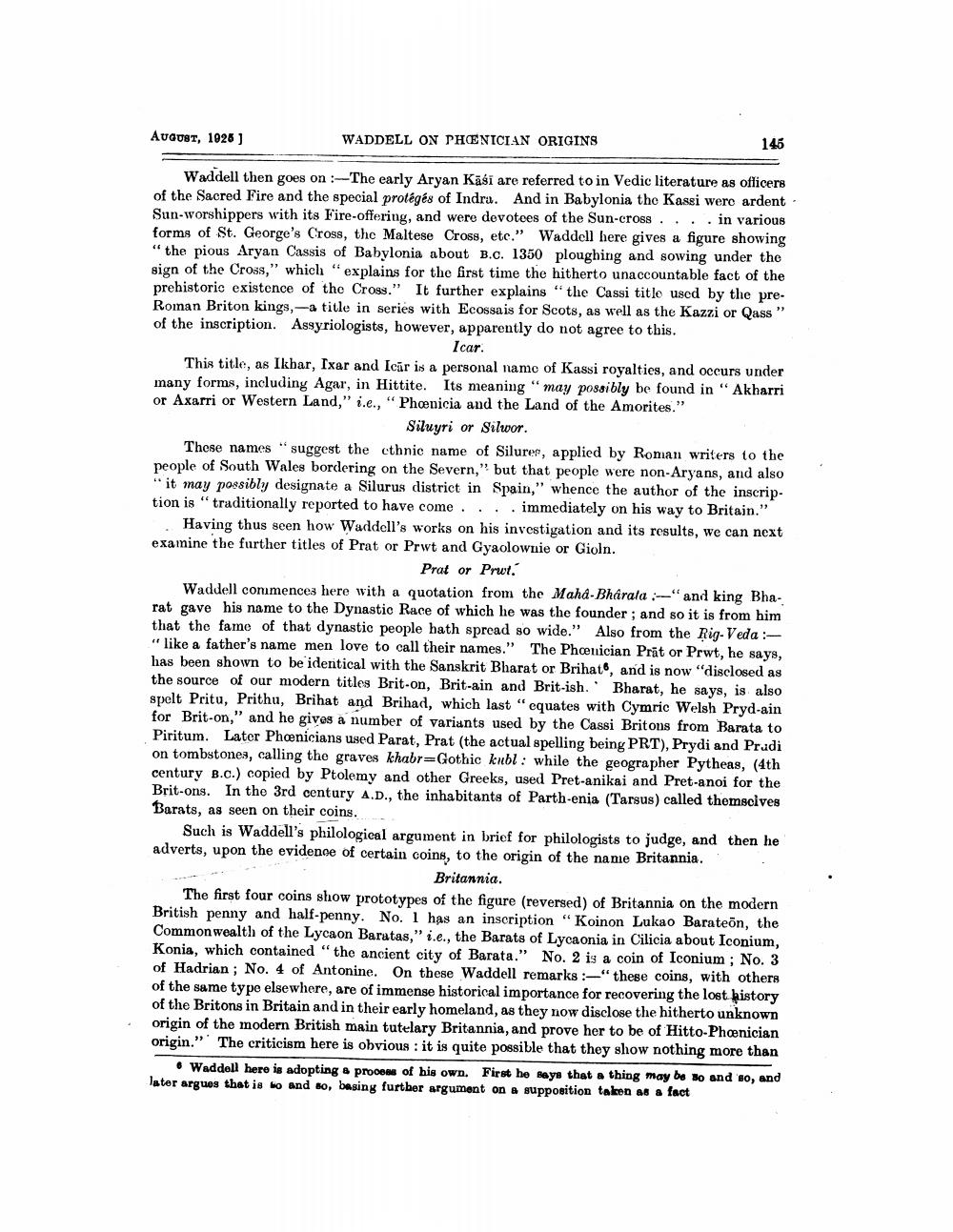________________
AUGUST, 1925]
WADDELL ON PHOENICIAN ORIGINS
145
Waddell then goes on:-The early Aryan Kasi are referred to in Vedic literature as officers of the Sacred Fire and the special protégés of Indra. And in Babylonia the Kassi were ardent Sun-worshippers with its Fire-offering, and were devotees of the Sun-cross. . . . in various forms of St. George's Cross, the Maltese Cross, etc." Waddell here gives a figure showing "the pious Aryan Cassis of Babylonia about B.c. 1350 ploughing and sowing under the sign of the Cross," which "explains for the first time the hitherto unaccountable fact of the prehistoric existence of the Cross." It further explains "the Cassi title used by the preRoman Briton kings,-a title in series with Ecossais for Scots, as well as the Kazzi or Qass" of the inscription. Assyriologists, however, apparently do not agree to this.
Icar.
This title, as Ikhar, Ixar and Icar is a personal name of Kassi royalties, and occurs under many forms, including Agar, in Hittite. Its meaning "may possibly be found in "Akharri or Axarri or Western Land," i.e., "Phoenicia and the Land of the Amorites."
Siluyri or Silwor.
These names suggest the ethnic name of Silures, applied by Roman writers to the people of South Wales bordering on the Severn," but that people were non-Aryans, and also "it may possibly designate a Silurus district in Spain," whence the author of the inscription is "traditionally reported to have come... immediately on his way to Britain."
Having thus seen how Waddell's works on his investigation and its results, we can next examine the further titles of Prat or Prwt and Gyaolownie or Gioln.
Prat or Prut.
Waddell commences here with a quotation from the Maha-Bharata :-" and king Bharat gave his name to the Dynastic Race of which he was the founder; and so it is from him that the fame of that dynastic people hath spread so wide." Also from the Rig-Veda :"like a father's name men love to call their names." The Phoenician Prat or Prwt, he says, has been shown to be identical with the Sanskrit Bharat or Brihat, and is now "disclosed as the source of our modern titles Brit-on, Brit-ain and Brit-ish. Bharat, he says, is also spelt Pritu, Prithu, Brihat and Brihad, which last "equates with Cymric Welsh Pryd-ain for Brit-on," and he gives a number of variants used by the Cassi Britons from Barata to Piritum. Later Phoenicians used Parat, Prat (the actual spelling being PRT), Prydi and Prudi on tombstones, calling the graves khabr Gothic kubl: while the geographer Pytheas, (4th century B.C.) copied by Ptolemy and other Greeks, used Pret-anikai and Pret-anoi for the Brit-ons. In the 3rd century A.D., the inhabitants of Parth-enia (Tarsus) called themselves Barats, as seen on their coins.
Such is Waddell's philological argument in brief for philologists to judge, and then he adverts, upon the evidence of certain coins, to the origin of the name Britannia.
Britannia.
The first four coins show prototypes of the figure (reversed) of Britannia on the modern British penny and half-penny. No. 1 has an inscription "Koinon Lukao Barateōn, the Commonwealth of the Lycaon Baratas," i.e., the Barats of Lycaonia in Cilicia about Iconium, Konia, which contained "the ancient city of Barata." No. 2 is a coin of Iconium; No. 3 of Hadrian; No. 4 of Antonine. On these Waddell remarks:-"these coins, with others of the same type elsewhere, are of immense historical importance for recovering the lost history of the Britons in Britain and in their early homeland, as they now disclose the hitherto unknown origin of the modern British main tutelary Britannia, and prove her to be of Hitto-Phoenician origin." The criticism here is obvious: it is quite possible that they show nothing more than
Waddell here is adopting a process of his own. First he says that a thing may be so and so, and later argues that is to and so, basing further argument on a supposition taken as a fact




